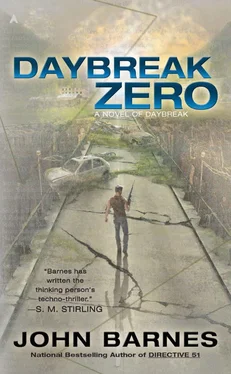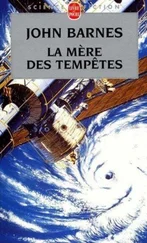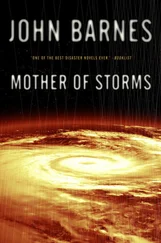The little Stearman shuddered and jerked in the gusts; Bambi thought too much, uselessly, about shear and stress on a canvas biplane wing. She climbed as high as she could, opening the throttle wide, burning more fuel but it was a race she had to win.
Half an hour later she had lost. In her fight with the storm, she had been hoping to beat it with a quick right cross; but it turned out the storm packed a mighty left haymaker. Off to her left, more thunderheads sailed toward her like God’s own galleons.
She might barely make it back to Ontario, but that would sacrifice the precious plane.
She could land on a road, but to sit through a storm on the ground the Stearman needed shelter—a high school gym or a good-sized auto repair shop—because the wind could slam the little fabric-and-wood biplane around like an empty cardboard box. Besides, even if she had known where there was a suitable building with a landable field or road, everywhere outside the towns in this country there were biotes and nanos on the ground, wrecks on the highway, bandits and tribals in the burned-out buildings.
Running as fast and high as she could, Bambi followed the road to the Snake River, and the river into Hells Canyon, toward the last friendly sunlight, hoping to see a place to land.
In the depths of the pine-lined canyon, the Snake River was already in darkness; the road beside it occasionally looped up into the light. Can’t land where I am, and dead in a short while is better than dead in a really short while.
Still running from the storm, Bambi turned due east out of the canyon, over even wilder country, crossing the low range of mountains.
There.
Where a low saddle in the mountains to the west allowed daylight through, she found a long almost-straight stretch of highway, and a few buildings surrounding a dirt parking lot. She came down quickly in a big semicircle; no wires or poles, either, and the pines weren’t moving; the storm winds had not yet come this far.
To give herself as much road as possible, Bambi came in about twenty feet above the treetops, descended into the shadowy tree-surrounded meadow enclosed by a curve in the road, and touched down in the long, straight uphill stretch she was aiming for.
The wood-spoked tail wheel bottomed on its springs, the Stearman slammed down like a brick, and the greased-linen tires made a heavy whump! on the road. The tail wheel lifted momentarily, sending her heart into her mouth, but the plane settled onto its wheels, and she rolled smoothly up the hill in the mountain twilight, idling the engine to keep some forward way with the propeller; the tops of the Douglas firs were still in sunlight but the road was dim.
She passed a shield sign for US 95, and mile marker 178 as she taxied over the top of the rise. She throttled back further but the engine gasped like a dying fish and the prop stopped cold; out of fuel. Well, it got me to the ground.
With no brakes on the wheels, rolling down the gentle slope, she used the flaps to hold the plane down against the hill and keep it from taking off like a hang-glider. At the open gate in the chain-link fence to her right, she turned in an awkward pivot into the parking lot. No cars, just a couple jeeps and horse and canoe trailers by the building. Must’ve been a summer resort only, with almost no one here on Daybreak day.
She bumped along the central aisle, slowing to a stop as the saggy, soft linen tires dragged on the gravel.
The chain on the door of the big steel storage building yielded to the bolt cutters from her emergency kit. Grinding through rotted plastic fittings and glides, the metal of the tracks and wheels shrieked as the big door rolled up on its counterweights. The last gleams of daylight revealed nothing scary like bears or dangerous like people. The room smelled musty and unpleasant, like a furniture store that had been closed up too long, reeking of rodents and decay.
The wood-and-fabric Stearman was so light that with effort, Bambi could drag it into the big building by its tail. She tied off the wing and tail eyebolts to pillars. She couldn’t force the door down manually, but the Stearman was at least secure against the wind; it could stand a little rain. She grabbed her gear from the forward cockpit.
In the last shimmering gray glow of twilight, the sign on the little house said VISITOR CENTER. Oh, good, I’m a visitor. The door was unlocked.
Her candle lantern revealed racks of brochures, a toilet whose seat had crumbled into dust, a steel shelving unit with piles of paper-covered clay-like goop that had probably once been office work trays. The leather sofa and desk chair must have been well-enough sealed to keep biotes out of their foam lining. Unlike some places she’d slept on some missions, there was no wildlife to chase away or mummified corpses to drag out and bury.
Bambi set the candle lantern on the desk and unpacked her emergency radio. The glass jars had clean, unbroken seals with no trace of nanoswarm’s white-gray crusts around the edges, and the transmitter went together easily. She cranked the little magneto to charge the capacitors, pausing every few minutes to wipe all the contacts with a lye-soaked rag; no visible nanoswarm was forming. Inside the little electroscope made from a baby-food jar, the aluminum-foil leaves did not sink perceptibly while she counted off twenty seconds orally; the capacitors were holding charge. Time for the less-fun part.
Night and storm had arrived while she worked on her radio; it was full dark and pouring. In flashes of lightning she made out a wooden post at about the right distance. Rather than get her clothes wet, she stripped, put her boots back on, and ran to the post, trailing the modified 100-foot extension cord behind her. She clipped the booster-cable clamp on and dashed back. If she hadn’t gotten too turned around in the dark, her antenna probably ran east-west, so the mountainside should reflect it in the right direction easily.
To avoid getting water near the radio transmitter, she toweled off with her dirty shirt, put on her spare, and made sure no drips lurked anywhere. When she checked the radio, the electroscope’s leaves hadn’t descended discernibly; that was very good.
She’d practiced her Morse religiously, and now she made that key clatter, sending her message three times before the electroscope’s leaves collapsed together, indicating the energy in the capacitors was gone. She cranked it up again and sent five times before the charge again dissipated; repeated the process a few more times.
No immediate response clicked in the earphones of her crystal rig. She sent CL ( dah-dit-dah-dit, dit-dah-diddit , the code for going off the air), and left her phones on while she dug into her pack and fixed herself a cheese and jerky sandwich. When she blew out the candle, her watch showed only 9:30. She put her gun and ax within reach of her sleeping bag on the big leather couch, and positioned the headphones by the chair cushion that was her pillow, so that, in the forest silence, any signal might wake her.
Days like this could make you wish the great majority of the human race hadn’t died in the past year, and there was still Internet, cold beer in the summertime, and cybercrime.
Heather O’Grainne is gonna freak when she hears a plane is down. I sure hope that radio message got through somewhere, or it’s gonna be hell for everyone else till they find me. The thought that Heather would be on top of this, and meanwhile she had food in her stomach and a warm dry place to sleep, put things in perspective. As Bambi drifted off, the last distant lightning flickered, and the rain settled to a soft patter. The radio will wake me up, and it’ll be Heather.
Читать дальше












